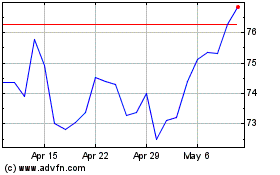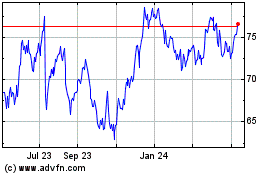Proposed Financial Crisis Fee Could Cost Biggest Banks $2 Billion
January 14 2010 - 5:24PM
Dow Jones News
President Barack Obama's proposed Financial Crisis
Responsibility Fee is likely to cost the three biggest banks as
much as $2 billion a year, analysts said.
Banks and their representatives reacted to the proposed fee,
intended to recoup some $117 billion in expected losses to the
government from the financial system bailout, with a mixture of
resignation and defiance.
Wells Fargo & Co. (WFC) "was asked to participate in the
TARP, and we did. We repaid the full investment to the government
plus $1.4 billion in dividends," the San Francisco bank said in a
statement. "We hope that additional or punitive government fees
will not reduce the industry's ability to help consumer and small
businesses access capital and credit, which lenders such as Wells
Fargo have done consistently before and throughout this
recession."
J.P. Morgan Chase & Co.'s (JPM) Chairman and Chief Executive
Jamie Dimon said Wednesday on CNBC television he accepts that banks
will be taken to task to reimburse taxpayers for preventing a
collapse of the financial system - but such reimbursement should
not be in form of a penalty.
But some banking representatives balked at the proposal that
their industry will now have to pay for the problems of the auto
industry, and Fannie Mae (FNM) and Freddie Mac (FRE), in addition
to the parts of the crisis where bankers have accepted some
responsibility, namely sloppy mortgage underwriting and taking too
much risk.
What's more, "we are far from any shortfall" in taxpayer money
from TARP, said Scott Talbott, a vice president for government
affairs at the Financial Services Roundtable, a lobbying group for
large banks. "We don't know the end result of TARP. We think it
will be a profit" for the Treasury Department. As such, the tax is
premature, he said.
The sums that banks will have to pay are large. Analysts
estimate that the fee for J.P. Morgan Chase, Citigroup Inc. (C) and
Bank of America Corp. (BAC) would likely be around $2 billion.
Wells Fargo might have to pay around $700 million a year. Morgan
Stanley (MS) will have to pay around $1 billion, Goldman Sachs
Group Inc. (GS) a bit more, analyst calculate.
The fee for Bank of New York Mellon Corp (BK) and State Street
Corp. (STT) could come in around $200 million. All banks contacted
for this story declined to comment on the fee.
Some foreign banks that operate in the U.S. would have to pay.
Some large U.S. non-bank financial companies also would be subject
to the fee.
Analysts described the impact of the fee on the institutions as
more of a headwind than a crippling penalty. Like many bankers,
analysts believe that it will be the customers who ultimately
suffer the consequences.
"If the bank fee were to run straight through to the bottom
line, it would hit the institutions' net income for a range of 1.5%
to 11.3% of their 2011 estimated earnings," Oppenheimer & Co.
analyst Chris Kotowski wrote in a research note. "However, we don't
believe that the fee will run directly to the bottom line. We view
it as effectively an increase in the wholesale cost of funds that
will be passed through to the customers" that take out loans, he
wrote.
Analysts pointed to the fee as one more example of the
heightened regulatory risk facing banks in the wake of the
financial crisis. Public anger at the initial bailout has boiled
over as the banks have recuperated from their near collapse far
more quickly than struggling homeowners, laid-off workers and the
broad economy.
Congressman Barney Frank, the chairman of the House Financial
Services Committee, said on CNBC that banks benefited far more from
TARP than simply through the cash infusions they received, because
TARP prevented the banking system from collapsing in the fall of
2008. For that, he said, taxpayers should get their share.
The tax on banks, thrifts, and insurance companies with more
than $50 billion in assets is, in effect, a way to discourage risk.
The proposed fee is 0.15% of bank assets minus tier 1 capital and
deposits insured by the Federal Deposit Insurance Corp. -
essentially taxing the risk banks take by borrowing money to make
loans.
But risk is part of banking, Talbott said. "The tax hits an
essential part of banking," he said. Forcing bankers to rely only
on customer deposits to make loans might limit their ability to
lend, Talbott and bankers said.
- By Matthias Rieker, Dow Jones Newswires; 212-416-2471;
matthias.rieker@dowjones.com
State Street (NYSE:STT)
Historical Stock Chart
From May 2024 to Jun 2024

State Street (NYSE:STT)
Historical Stock Chart
From Jun 2023 to Jun 2024
